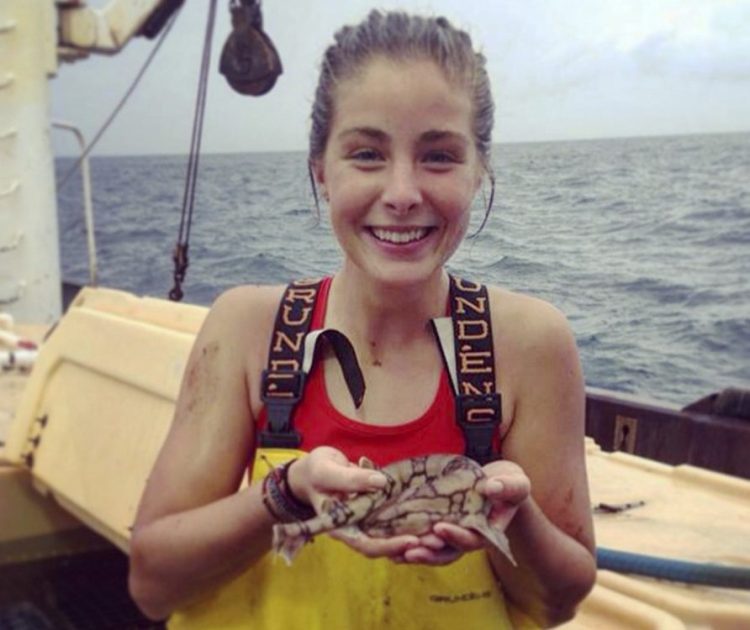Hanna Sihler has less than two weeks left to come up with $35,428 dollars. It’s not for her tuition at the University of New England’s (UNE) waterfront campus in Biddeford. She’s raising money to fund a solar project that would allow Scarborough’s Camp Ketcha to reduce carbon emissions and save money on its electricity costs.
Source called her to ask what motivated her and how she and her classmates are raising money. Along the way, we also learned something about sharks and the allure of physics.
REVOLVING DOOR: Sihler is a junior majoring in oceanography and biophysics. One of her advisers, associate professor Noah Perlut, met Re-Volv executive director Andreas Karelas at a conference and learned about the group’s work with college students. Re-Volv helps crowdsource solar projects around the nation and runs a Solar Ambassador Project directed at college students who want to help a community organization near their campus finance and install solar projects. The students serve as fundraisers who also educate their communities about the value of solar power. The overarching goal is to reduce carbon emissions and build a network of new environmental stewards. Perlut suggested his students apply, and after racing to put together an application in under a week, they were named Re-Volv ambassadors. Sihler is the lead on the UNE project, one of three current university projects – others are in the pipeline – Re-Volv is backing around the country.
SHINE A LIGHT: Silher and her classmates had to pick a worthy nonprofit for the project. One of the group’s members, an alternative education student, had children who had benefited from Camp Ketcha’s school programs and suggested the Scarborough camp, which has programs during the school year (a Montessori preschool and after-school programs) as well as traditional, equestrian and other specialty summer camps. “They are so well rounded about what they do for the community,” Silher said. “We wanted to partner with a nonprofit that was going to give back to the community.” Moreover, they saw the potential to influence another generation through Camp Ketcha. “We want to instill those environmental ideas, those caring ideas, in kids.” Sihler directed a video made by the UNE students as a fundraising tool (she got to “drive” a drone). The group of five students is working with ReVision Energy, which will install the panels. The crowdfunded donations go into a revolving fund while Re-Volv covers the upfront costs for the materials and installation. Over 20 years, the camp will pay a small lease fee on the installation. That money will be reinvested into Re-Volv’s Solar Seed Fund, which will be used for other projects down the line.
SOLAR APPEAL: Solar power wasn’t a foreign concept to Sihler, who grew up in Killington, Vermont (yes, she learned to ski at about the same time she learned to walk), and attended high school in nearby Rutland. “We had a solar farm right next to my high school,” she said. It was built on top of a decommissioned city landfill. “They thought it could be used for something other than just kids going out there.” I’ll say: What they built was big enough to land Rutland the honor of having the most solar per capita of any city in New England. That solar farm won the 2015 Project of Distinction Award from the Solar Energy Industries Association.
SUN SAVINGS: How much money and energy will the Camp Ketcha solar projects save? Projections show the solar array on the roof of a barn at the camp will save the nonprofit 15 percent on their annual electricity bill, Sihler said, with solar energy providing 98 percent of their electricity. In the first year alone, the project is expected to offset 19,000 lbs of CO2 emissions. To cover the costs, the UNE students are committed to raising $35,428. They’ve got a website set up to take tax-deductible donations, as well as a Facebook page. The UNE ambassadors have held fundraisers at Portland Pie (with 10 percent of sales going to the Camp Ketcha project) and are planning raffles and an ice cream (“sundaes” and yes, they’re punning on Sun Days) event, as well. They’ll be showing up at farmers markets around the area for the rest of the month asking for donations and answering questions about the benefits of solar power. Even a dollar donation is welcome, Sihler said.
SHARK TANK: Sihler first became aware of UNE through its soccer program. As a high school athlete, she was looking for a school that allowed her to play soccer but put academics first. She’s found that to be the case at UNE. “My coach really wants me to succeed post-college,” she said. Her early interest in marine biology evolved into an oceanography and physics major after she’d had a few semesters at the school and realized how much she enjoyed math and physics. “I love the ocean, but I love physics,” she said. “UNE helped me realize what I could do.” She lists shark research among her more memorable coursework, using the waters off Orchard Beach and also Rhode Island to study populations of everything from basking sharks to dogfish, “which are really tiny but classified as sharks.” ” And no, she hasn’t seen any great whites. “I know that is a huge question. There could be some here or there, but we didn’t see any.” The research involved catching sharks with “regular rod and reel,” bringing them up on the boat, taking blood and measurements. “I have seen pretty big ones. Like 8 or 9 feet.” That sounds like fun. “Oh my gosh, it is a blast.”
Mary Pols can be contacted at 791-6456 or at:
Twitter: MaryPols
Send questions/comments to the editors.



